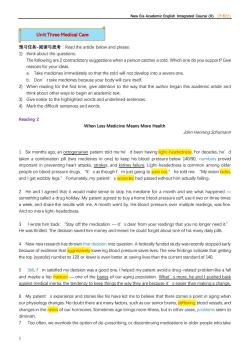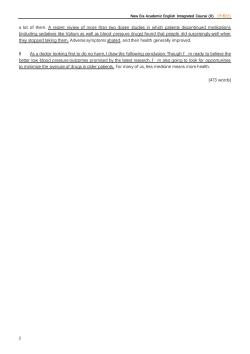《新编大学英语》课程教学资源(讲义)Reading Skill 6 Working with Academic Generalization 预习-U3-Reading2-Text

New Era Academic English Integrated Course())[外教 Unit Three Medical Care 预习任务-阅读与思考:Read the article below and please 1)think about the questions: The following are 2 contradictory suggestions when a person catches a cold.Which one do you support?Give reasons for your ideas. a.take medicines immediately so that the cold will not develop into a severe one b.Don'ttake medicines because your body will cure itself 2)When reading for the first time.give attention to the way that the author began this academic artide and think about other ways to begin an academic text. 3)Give notice to the highlighted words and underlined sentences. 4)Mark the difficult sentences and words. Reading 2 When Less Medicine Means More Health John Henning Schumann 1 Six months ago.an octogenarian patient told me he'd been havingight-headedness.For decades.he'd taken a combination pill (two medicines in one)to keep his blood pressure below 140/90.numbers proved important in preventing heart attacks,strokes.and kidney failure.Light-headedness is common among older people on blood pressure drugs.'It s as though I'm just going to pass out,"he told me."My vision fades and I get wobbly legs."Fortunately,my patient's episodes had passed without him actually falling. 2 He and I agreed that it would make sense to stop his medicine for a month and see what happened- something called a drug holiday.My patient agreed to buy a home blood pressure cuff.use it two or three times a week,and share the results with me.A month went by.His blood pressure.over multiple readings.was fine. And no more light-headedness. 4 Now newresearch has thrown that decision into question.A federally funded study was recently stopped early because of evidence lowering blood pressure saves lives.The new findings indicate that getting 5 Still.m satisfied my decision was a good one.I helped my patient avoid a drug-related problem like a fall and maybe a hip fracture-one of the banes of our aging population.What's more,he and I pushed back against medical inertia,the tendency to keep things the way they are because it s easier than making a change. 6My patients experience and stories like his have led me to believe that there comes a point inaging wher our physiology changes.No doubt there are many factors,such as our senior brains.stiffening blood vessels,and changes in the ratios of our hormones.Sometimes age brings more illness,but in other cases,problems seem to diminish. 7 Too often.we overlook the option of de-prescribing.or discontinuing medications in older people who take
New Era Academic English Integrated Course (II) [外教社] 1 预习任务-阅读与思考:Read the article below and please: 1) think about the questions: The following are 2 contradictory suggestions when a person catches a cold. Which one do you support? Give reasons for your ideas. a. Take medicines immediately so that the cold will not develop into a severe one. b. Don’t take medicines because your body will cure itself. 2) When reading for the first time, give attention to the way that the author began this academic article and think about other ways to begin an academic text. 3) Give notice to the highlighted words and underlined sentences. 4) Mark the difficult sentences and words. Reading 2 When Less Medicine Means More Health John Henning Schumann 1 Six months ago, an octogenarian patient told me he’d been having light-headedness. For decades, he’d taken a combination pill (two medicines in one) to keep his blood pressure below 140/90, numbers proved important in preventing heart attacks, strokes, and kidney failure. Light-headedness is common among older people on blood pressure drugs. “It’s as though I’m just going to pass out,” he told me. “My vision fades, and I get wobbly legs.” Fortunately, my patient’s episodes had passed without him actually falling. 2 He and I agreed that it would make sense to stop his medicine for a month and see what happened — something called a drug holiday. My patient agreed to buy a home blood pressure cuff, use it two or three times a week, and share the results with me. A month went by. His blood pressure, over multiple readings, was fine. And no more light-headedness. 3 I wrote him back: “Stay off the medication — it’s clear from your readings that you no longer need it.” He was thrilled. The decision saved him money and meant he could forget about one of his many daily pills. 4 Now new research has thrown that decision into question. A federally funded study was recently stopped early because of evidence that aggressively lowering blood pressure saves lives. The new findings indicate that getting the top (systolic) number to 120 or lower is even better at saving lives than the current standard of 140. 5 Still, I’m satisfied my decision was a good one. I helped my patient avoid a drug-related problem like a fall and maybe a hip fracture — one of the banes of our aging population. What’s more, he and I pushed back against medical inertia, the tendency to keep things the way they are because it’s easier than making a change. 6 My patient’s experience and stories like his have led me to believe that there comes a point in aging when our physiology changes. No doubt there are many factors, such as our senior brains, stiffening blood vessels, and changes in the ratios of our hormones. Sometimes age brings more illness, but in other cases, problems seem to diminish. 7 Too often, we overlook the option of de-prescribing, or discontinuing medications in older people who take Unit Three Medical Care

New Era Academic English Integrated Course(D)[外板 a lot of them.A recent review of more than two dozen studies in which patients discontinued medications (induding sedatives like Valium as well as blood pressure drugs)found that people did surprisingly well when they stopped taking them.Adverse symptoms abated,and their health generally improved. 8 As a doctor looking first to do no harm.I draw the following conclusion:Though I'm ready to believe the better low blood pressure outcomes promised by the latest research,I'm also going to look for opportunities to minimize the overuse of drugs in older patients.For many of us.less medicine means more health. (473words) 2
New Era Academic English Integrated Course (II) [外教社] 2 a lot of them. A recent review of more than two dozen studies in which patients discontinued medications (including sedatives like Valium as well as blood pressure drugs) found that people did surprisingly well when they stopped taking them. Adverse symptoms abated, and their health generally improved. 8 As a doctor looking first to do no harm, I draw the following conclusion: Though I’m ready to believe the better low blood pressure outcomes promised by the latest research, I’m also going to look for opportunities to minimize the overuse of drugs in older patients. For many of us, less medicine means more health. (473 words)
按次数下载不扣除下载券;
注册用户24小时内重复下载只扣除一次;
顺序:VIP每日次数-->可用次数-->下载券;
- 《新编大学英语》课程教学资源(讲义)Reading Skill 4 Facts and Opinions 预习-U3-Reading1-Text.docx
- 《新编大学英语》课程教学资源(讲义)Reading Skill 3 Main Ideas and Supporting Details U2-Reading2.docx
- 《新编大学英语》课程PPT教学课件(讲稿,第四版)B1 Unit 5 Bridge cultural gaps Reading 2.pptx
- 《新编大学英语》课程PPT教学课件(讲稿,第四版)B1 Unit 5 Bridge cultural gaps Reading 1.pptx
- 《新编大学英语》课程PPT教学课件(讲稿,第四版)B1 Unit 4 The art of choice Reading 2.pptx
- 《新编大学英语》课程PPT教学课件(讲稿,第四版)B1 Unit 4 The art of choice Reading 1.pptx
- 《新编大学英语》课程PPT教学课件(讲稿,第四版)Reading Skill 1 Working with Academic Definition Week1-2-预习-U2-Reading1-Text.docx
- 《新编大学英语》课程PPT教学课件(讲稿,第四版)Reading Skill 1 Working with Academic Definition 1.3 Evaluation of Academic Definition.pptx
- 《新编大学英语》课程PPT教学课件(讲稿,第四版)Reading Skill 1 Working with Academic Definition 1.2 Categories of Academic Definition.pptx
- 《新编大学英语》课程PPT教学课件(讲稿,第四版)Reading Skill 1 Working with Academic Definition 1.1 Recognition of Academic Definition.pptx
- 《新编大学英语》课程PPT教学课件(讲稿,第四版)B1 Unit 2 The Pace of Life Reading 1.pptx
- 《新编大学英语》课程PPT教学课件(讲稿,第四版)B1 Unit 2 The Pace of Life Reading 2.pptx
- 《新编大学英语》课程PPT教学课件(讲稿,第四版)B1 Unit 1 Good to Great Reading 2.pptx
- 《新编大学英语》课程PPT教学课件(讲稿,第四版)B1 Unit 1 Good to Great Reading 1.pptx
- 西北农林科技大学:《动物病理解剖学》课程教学资源(实验指导)动物病理解剖学实验实习指导(共20个,打印版).pdf
- 山东第一医科大学(山东省医学科学院):《高级英语》课程授课教案(三,打印版).pdf
- 山东第一医科大学(山东省医学科学院):《高级英语》课程授课教案(二,打印版).pdf
- 山东第一医科大学(山东省医学科学院):《高级英语》课程授课教案(一,打印版).pdf
- 大连大学:英语专业课程教学大纲汇编(2010).doc
- 大连大学:日语专业课程教学大纲汇编(2010).doc
- 《新编大学英语》课程PPT教学课件(讲稿,第四版)B1 Unit 3 In the name of Love further development.pptx
- 《新编大学英语》课程PPT教学课件(讲稿,第四版)B1 Unit 3 In the name of Love reading 1.pptx
- 《新编大学英语》课程PPT教学课件(讲稿,第四版)B1 Unit 3 In the name of Love reading 2.pptx
- 《新编大学英语》课程教学资源(讲义)Reading Skill 7 Monitoring and Fix-up Reading 预习-U5-Reading1-Text.docx
- 北京信息科技大学:外国语学院各专业课程教学大纲汇编.pdf
- 湖南人文科技学院:《英语演讲》课程思政教学资源(PPT课件)01 Analyzing the audience.pptx
- 湖南人文科技学院:《英语演讲》课程思政教学资源(PPT课件)02 Selecting a topic.pptx
- 湖南人文科技学院:《英语演讲》课程思政教学资源(PPT课件)03 Using language.pptx
- 湖南人文科技学院:《英语演讲》课程思政教学资源(PPT课件)04 Supporting your ideas.pptx
- 湖南人文科技学院:《英语演讲》课程思政教学资源(授课教案)01 Analyzing the audience.pdf
- 湖南人文科技学院:《英语演讲》课程思政教学资源(授课教案)02 Selecting a topic.pdf
- 湖南人文科技学院:《英语演讲》课程思政教学资源(授课教案)03 Using language.pdf
- 湖南人文科技学院:《英语演讲》课程思政教学资源(授课教案)04 Supporting your ideas.pdf
- 大连大学:英语学院翻译专业课程教学大纲汇编.pdf
- 大连大学:英语学院英语专业课程教学大纲汇编.pdf
- 大连大学:日本语言文化学院日语专业课程教学大纲汇编.pdf
- 《英语口语》课程教学资源(学习资料)U1 Extra Reading:The stressed-out generation.pdf
- 《英语口语》课程教学资源(学习资料)U2 Extra Reading:Are superheroes good role models.pdf
- 《英语口语》课程教学资源(学习资料)U3 Extra Reading:The economics of happiness.pdf
- 《英语口语》课程教学资源(学习资料)U6 Extra Reading:Giving something back.pdf
